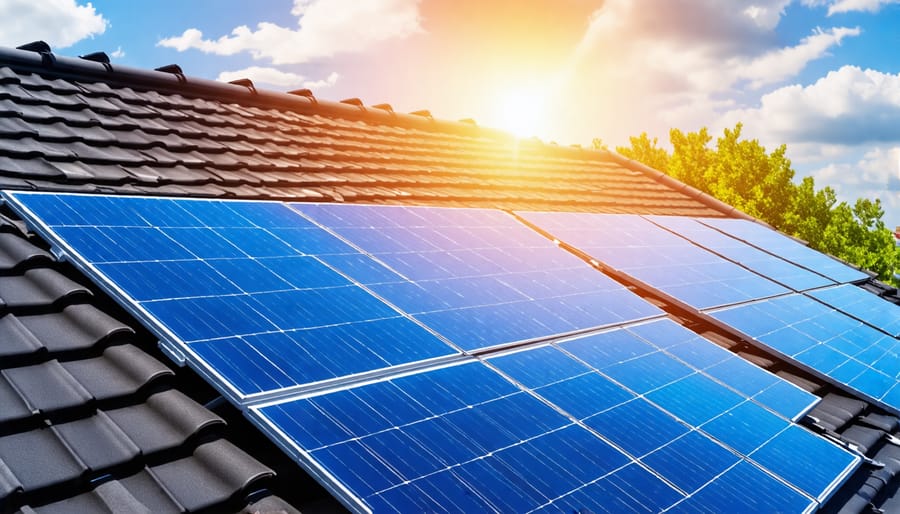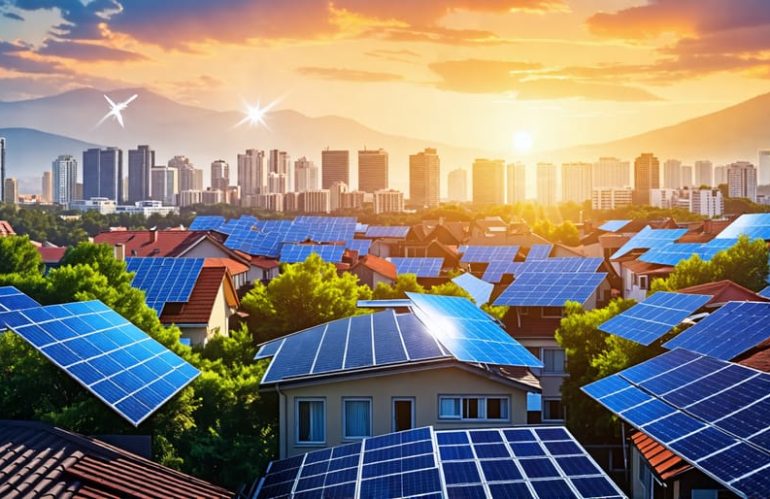Harnessing the power of the sun, solar panels offer a clean, renewable energy solution that can significantly reduce our reliance on fossil fuels. By converting sunlight into electricity, solar energy systems help cut greenhouse gas emissions, mitigate air pollution, and conserve precious natural resources. The environmental pros and cons of solar power demonstrate its immense potential to combat climate change, with the added benefits of lower energy bills and increased energy independence for homeowners. As the world faces the urgent need to transition to sustainable energy sources, solar panels emerge as a beacon of hope, empowering individuals to take action and create a greener future for generations to come.

Solar Energy Reduces Greenhouse Gas Emissions
Slowing Climate Change
Solar panels play a crucial role in slowing climate change by reducing greenhouse gas emissions. By generating clean, renewable electricity from the sun, solar panels decrease our reliance on fossil fuels like coal and natural gas, which emit large amounts of carbon dioxide and other pollutants when burned. This helps mitigate global warming, as these emissions trap heat in the atmosphere, leading to rising temperatures and sea levels, as well as more frequent and intense extreme weather events.
Adopting solar energy on a wider scale can significantly slow the pace of climate change. Every home that switches to solar reduces its carbon footprint, contributing to a collective effort to create a more sustainable future. As more households embrace solar power, we can limit the devastating effects of climate change, preserving our planet for generations to come.
Improving Air Quality
Solar energy is a clean, renewable alternative to fossil fuels that significantly improves air quality. By harnessing the power of the sun, solar panels generate electricity without emitting harmful pollutants like carbon dioxide, sulfur dioxide, and nitrogen oxides. These pollutants contribute to smog, acid rain, and respiratory issues when released by coal and natural gas power plants. In contrast, solar panels produce no emissions during operation, reducing the overall concentration of pollutants in the atmosphere. This leads to cleaner air and better public health outcomes, particularly in densely populated urban areas prone to smog. Studies have shown that increased solar adoption can lower rates of asthma, bronchitis, and other respiratory illnesses exacerbated by poor air quality. By choosing solar, homeowners not only save money on energy bills but also contribute to a healthier environment for their families and communities.
Preserving Natural Resources
Solar panels harness the power of the sun, reducing our reliance on finite resources like coal, oil, and natural gas. By transitioning to solar energy, we can decrease the need to extract these resources from the earth, helping to preserve our planet’s natural reserves for future generations. Additionally, solar panel installations require significantly less land compared to traditional power plants, allowing for greater conservation of habitats and ecosystems.
The extraction and burning of fossil fuels not only depletes these resources but also leads to habitat destruction and pollution. Solar energy offers a clean and renewable alternative that minimizes the impact on the environment. By generating electricity from the sun, solar panels reduce the demand for fossil fuels, thereby decreasing the need for mining, drilling, and fracking operations that can harm wildlife and their habitats.
Moreover, the widespread adoption of solar energy can help protect vulnerable ecosystems, such as forests and wetlands, from being cleared for resource extraction or power plant construction. By installing solar panels on rooftops and in previously developed areas, we can generate clean electricity while preserving untouched natural habitats and biodiversity.
In summary, solar panels play a crucial role in preserving our planet’s natural resources and protecting delicate ecosystems. By reducing our dependence on finite resources and minimizing the need for habitat-destroying extraction methods, solar energy contributes to a more sustainable future where nature can thrive alongside human progress.
Water Conservation Benefits
Solar energy not only reduces emissions but also helps preserve another precious resource: freshwater. Traditional power plants, whether fueled by coal, natural gas, or nuclear energy, consume vast amounts of water for cooling and steam generation. In fact, the power sector is one of the largest users of freshwater in the United States. By contrast, solar photovoltaic (PV) systems require minimal water to operate, primarily for occasional panel cleaning. This means that every megawatt-hour of electricity generated by solar panels saves thousands of gallons of water compared to fossil fuel or nuclear plants. As water scarcity becomes an increasingly pressing issue due to climate change and population growth, the water-saving benefits of solar energy become even more crucial. By choosing solar power, homeowners can significantly reduce their individual water footprint while contributing to the conservation of this life-sustaining resource on a larger scale. In arid regions where water is particularly scarce, the water efficiency of solar panels is an especially compelling advantage. By embracing solar energy, we can not only combat climate change but also protect our valuable freshwater supplies for generations to come.

Powering a Sustainable Future
Busting Solar Myths
Despite what you may have heard, solar energy is a highly reliable and efficient source of clean power. Debunk common misconceptions and discover the truth: modern solar panels can generate significant amounts of electricity even on cloudy days and in colder climates. Technological advancements have greatly improved solar cell efficiency, with many panels now capable of converting over 20% of the sun’s energy into usable electricity. Additionally, solar battery storage systems allow you to store excess energy for use during nights or inclement weather, ensuring a consistent and dependable power supply for your home.
Conclusion
In conclusion, solar panels offer an array of environmental benefits that contribute to a cleaner, greener planet. By harnessing the power of the sun, solar energy reduces greenhouse gas emissions, minimizes air and water pollution, and conserves finite natural resources. Beyond its eco-friendly advantages, going solar also provides significant financial benefits for homeowners, lowering monthly utility bills and potentially increasing property value. As we strive towards a more sustainable future, embracing solar power is a crucial step in the right direction. By making the switch to solar panels, individuals can not only reduce their carbon footprint but also enjoy long-term savings. We encourage all homeowners to explore the possibility of installing solar panels and join the growing movement towards clean, renewable energy. Together, we can create a brighter, more sustainable world for generations to come.








